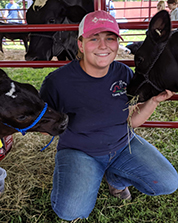
As I made another round with the rake and saw my grandfather on the baler, I couldn’t help but smile and kind of giggle a little bit. Up the hill a little way in front of me, the baler was in the process of dumping a neatly wrapped bale out of the back. However, we make hay on the rolling hills and Appalachian Mountains on our farm, so as the bale was released, I watched as it tore through the alfalfa field I was in and crashed into the corn field down below.
I already knew that Dad would be frustrated about having to get the bale out without damaging any more crops and that when we asked Granddad what happened, he would simply say, “I was trying to make the milk cow feed faster.” It was pointless to get upset, so I just shook my head and watched the bale whizz by me on the way down the hill.
Now, this is not the first time this has happened. There are always a couple of bales a year that “get away” from Granddad. When there aren’t any crops in the field below the alfalfa fields, it’s not bad getting them back out. However, when corn is in those fields, it can be a hassle.
Corn is a “golden crop,” much like alfalfa. It’s expensive to grow, maintain, and harvest, but the return is worth it as the cows tend to thrive off of the protein and energy it provides. But when a round bale heads down the hill at full speed and knocks down corn in the process, you’re most likely going to lose the poor crushed plants.
We always call these bales “the ones that got away.” Sometimes, it’s little things like this that break the monotony of everyday farming. There is no point in getting mad because what’s done is done. All you can do is shake your head and laugh. Even when you cringe over the thought of the little crushed corn plants, you silently admit that it’s kind of fun to watch the bale go barreling down the hill. Stay safe folks and watch out for wild hay bales!

The author is a sixth-generation farmer and fifth-generation dairy producer in southwest Virginia, where she and her family own and operate a 145-head Holstein dairy. Courtney is involved in agriculture organizations throughout her community and is a graduate of Virginia Tech.








